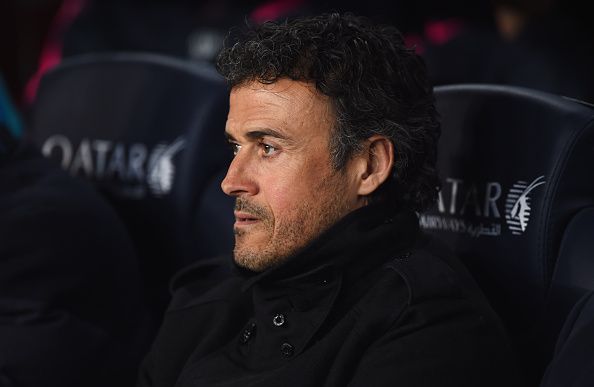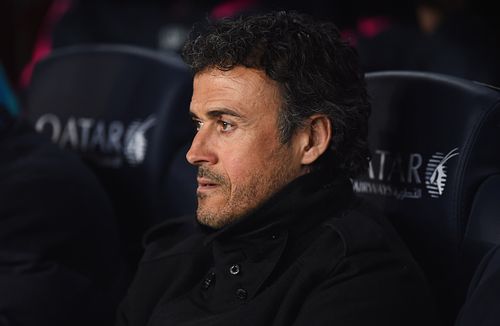
Weaknesses in Barcelona's system that can be exploited by opponents

After another hard fought and tense El Clasico, Barcelona left the stadium with a 2-1 victory and a four-point cushion atop of the league table. Barcelona has now won 19 out of their last 20 games and a team that just two months ago seemed on the edge of collapse now controls its own fate.
The catalyst for this turn-around has been Luis Enrique’s strategy to have the team play much more direct and to place Lionel Messi and Neymar (extremely) wide with Luis Suarez in the middle stretching the defence.
This approach has given the club a second life this season, but it is not without its flaws. Not surprisingly then, playing against a talented team like Real Madrid provides a great chance to analyse Enrique’s approach and Barcelona’s new look.
How Barcelona’s attacking trio create space
As was evident throughout the match, by placing Neymar and Messi near the touchlines and with Suarez occupying the central defenders, Barca splits the opposing defence and create massive space in between the full backs and centre backs. As was seen with Suarez’s magnificent goal, in this set up each striker has massive amounts of space they can exploit and allows each player the ability to use their skills against one or two defenders rather than against an entire back line.
Thus, Neymar, Messi, and Suarez have more room to operate, can cause more problems and each create a half-dozen scoring chances per game – it would not have shocked anyone if Barcelona ended up with 4 or 5 goals on Sunday. In its simplest form, Enrique has given his best players the space and match-ups to be successful.
Neymar can take on his defender and pull another defender towards him, helping to create open space for his teammates. Suarez can use his ability to exploit space and his touch to split the central defence, keep both central defenders occupied and continually pressure the goal.

And Messi, with this new system is given more space that allows him to do Messi magic and score or create goal scoring opportunities whenever he touches the ball and dominate the game by either cutting inside or controlling the game with pin-point passes.
Offensively, the new approach has been extremely successful. Barcelona’s world-class strikers are given the time and space they need to be deadly in attack and through this system there is probably no defence in the world that can stop all three of Barca’s superstars from capitalizing on the space and match-ups provided to them.
Barcelona’s attacking strategy leaves them vulnerable in defence
However, every system has it flaws and Real Madrid in the first half nearly finished the game by exploiting the weaknesses in Barca’s new approach. In the first half, Madrid illustrated how the flaws in Barca’s new approach, although offensively difficult to defend, opens up Barca defensively.
First, by playing Neymar and Messi so far wide, it creates a massive field and requires the midfield to control all that open space and win every 50-50 ball in midfield. Whenever there was a quick turnover or mishit ball, Real Madrid were on the counter in with superior numbers and only the outstanding play of Gerard Pique and Claudio Bravo saved the club.
Second, the best way to take advantage of Messi or Neymar out wide is to quickly play a long ball to them either from the defence or from across the field. This gives the player the chance to take their opponent on without help – a situation where Messi and Neymar will always have the edge.
However, those balls have a low percentage of being won and anytime they are not, Barcelona are not only outnumbered but also without a good defensive shape. Throughout the first half, Real Madrid were able to win a lot of these balls and counter, leaving Barcelona nearly helpless to stop them. This is how Madrid got their first goal and should have scored more. In fact, it wasn’t until the second half when Messi came into the middle to defend and try to control the game that Real Madrid’s offense began to slow.
Why Barcelona’s midfield tends to struggle with this strategy
Next, although this new approach plays to the strengths of Messi, Suarez, and Neymar, it actually plays against the strength of the club’s midfield. They have fewer options on the ball as their strikers are often too far away for a simple pass. Thus, the pace of play is increased forcing midfielders to run more and cover more ground. This causes the midfield to sometimes force the ball into places where possession is easily lost or try to change the field and play a 50-50 ball to either Messi or Neymar who is up against a defender.

Not surprising then that Barcelona continues to seem disjointed in the midfield with no cohesion and no strategy to attack from the middle ensuring the club often lacks a dynamic punch when a defense has time to set up against them in the final third. (Unless of course Messi is having a Messi game, then it usually doesn’t matter what the opponents do).
Finally, the approach relies too much on individual genius. When the genius works out, it’s great (Messi versus Manchester City or Suarez’s El Clasico goal) but when it doesn’t, Barca struggle to score and impose themselves on the game.
They no longer have the possession and short runs that created space and helped break down wall like defences (interestingly enough, once Xavi and Busquets came in, Barcelona went back to their old style and a tired Madrid almost gave up a classic Pep style Barcelona goal). As long as Messi, Neymar, and Suarez continue to play to their potential, Barcelona will have no problem scoring, but what happens if all three struggle at the same time?
Enrique has created a system and style that not only saved the season but maybe also his job (but barring a Champions League title, probably not). The success of it is hard to argue with. Barcelona still has a shot at a treble and should end the season with at least one trophy.
However, the flaws in the system are evident and so far only stellar play (on both sides of the ball) has kept the holes from tearing the system apart. If Enrique can find a way to continue to get unbelievable performances from Pique, Bravo, and the rest of the squad, anything is possible. But if a team can exploit the weaknesses in Barca’s new system (and Real Madrid nearly did), it is going to take more than a magical moment from Messi to save the day.